About the Case
Date: June 4, 1895
County: Chilton
Victim(s): James Powell
Sex of Victim(s):male
Case Status: attempted
James Powell
June 4, 1895
Strasburg, Chilton County, Alabama
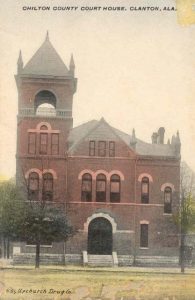
On Monday, June 3, 1895, James Powell was accused of entering the room of a white 15-year-old named Mary Bussey and attempting to assault her. Her father, John F. Bussey, reportedly heard her scream and rushed to her aid but was too late and got there only to see Powell escape out the window.[1] John Bussey then gathered a posse of white men and chased Powell 15 miles to Calera, where they captured him, brought him back to Strasburg, and had Mary identify him as her assailant. According to several newspapers, after Powell was identified, John Bussey and the mob were said to have been en route of the county courthouse in Clanton to turn him in. However, James Powell was found lynched a mile from Strasburg[2] between the late hours of June 4 and the early morning of June 5, 1895.[3]
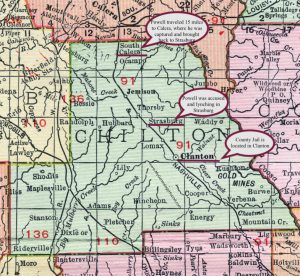
James Powell also referred to as Jim Powell in reports had a life that goes beyond the accusations from June 3 and the horrible events that followed. However, little documentation about Powell’s life exists. In the 1880 census, there are half-dozen black men named James Powell that lived near Chilton County that loosely fit the victim’s probable this was discovered by noticing that every Black James Powell listed in the 1880 census were between the ages of 18-19 and are not listed in the 1900 census, which could indicate one was the lynched man. But it is all speculation. Despite having limited documentation on Powell’s life, there are a couple of things I’ve realized by looking at all potential families of Powell and doing research on the Bussey family as well. First, all the Black Powell families lived more than an hour from Chilton County, most actually two hours away in Conecuh County. Secondly, again that every Black James Powell listed in the census was between the ages of 18-19, which may suggest that he was a friend to or in a consensual relationship with Mary, who was 15. If true, then perhaps Mary’s father discovered them together and killed him out of anger over her liaison with a black man. Thirdly, I could not find any affiliation between the Bussey family to any man named Powell. Although both families seemed to be farmers, the Bussey family did not own their own farm, ruling out the possibility of the Powell family or James Powell himself working on property owned by the Bussey family.
The lack of records about Powell’s life contributes to how easy it is for Chilton County and the United States to forget about James Powell and what happened to him. If the only records left of someone’s life are from the perspective of the white individuals who lynched him or like-minded people then we will struggle to ever know James Powell.
Relying heavily on databases like Newspapers.com and Chronicling America, I found articles about the case but they were not reliable because they come from a perspective of racial hatred instead of balanced reporting. After exhausting my research with these databases I checked African American newspaper databases, published books on Chilton County history and the surrounding counties, and Ancestry.com to see if I could find a birth or death record of James Powell or really any further information about his family. I found nothing.
What I have yet to find out about James Powell is his personal life, his birthday, and who his family was. The information that future researchers should try to find is sources that will be able to link James Powell to his family in a way that gives details about his life. There is a bit of information about his potential family and relatives that lived during and after his death like how most Black Powell families move further from Chilton County in the 1900s to Tuscaloosa, or even far out of state like Pennsylvania and the families they created after the loss of Powell.[4] Finding Powell’s family is important because it would give voice to his legacy but without any source or documentation to connection them, people will never know the ways in which James Powell has lived on through them.
The impact that James Powell made on the Chilton community was that he was one of nine African Americans to be lynched there. His life is another example of racial injustice that has to be addressed. Understanding this county’s history for the disregard of the black body speaks volumes to how important knowing James Powell’s story and others like it are. In order to move forward and heal from history, we must first know and acknowledge history. This begins with knowing who James Powell was and the legacy his life leaves behind. His life must be remembered and uncovered because in 1895 it was meant to be forgotten about, to be justified and silenced.
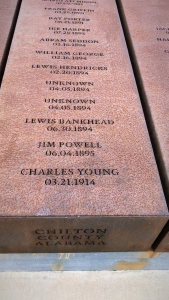

[1]“Identified and Then Strung Up,” The Pittsburgh Press (Pittsburgh, Pa) Jun. 06, 1895; “Strassburg. A Black Fiend Failed and Then Lynched,” The Times-Picayune (New Orleans, La) Jun. 06, 1895.
[2] The Soil sample collected from EJI, places the lynching site at a slightly different spot in Chilton County, still in the Strassburg area.
[3] “Hanged by a Mob,” The Delphos Daily Herald (Delphos, Ohio) Jun. 06, 1895.
[4] Year: 1900; Census Place: Greenville, Butler, Alabama; Page: 17; Enumeration District: 0020.
Featured Sources | |
|---|---|
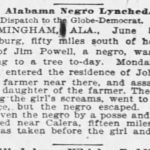
|
Alabama Negro LynchedType: Newspaper “Alabama Negro Lynched.” St. Louis Globe Democrat (St. Louis, MO), June 06, 1895. |
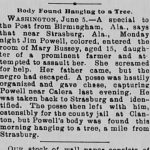
|
Body found hanging to a treeType: Newspaper “Body found hanging to a tree.” The Roanoke Times (Roanoke, VA), June 06, 1895. |
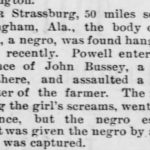
|
General NewsType: Newspaper “General News.” The Jetmore Rupublican (Jetmore, KS), June 12, 1895. |
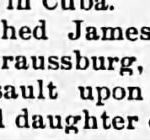
|
West and SouthType: Newspaper “West and South.” The Hope Pioneer (Hope, ND), June 14, 1895. |
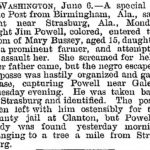
|
Hanged by a MobType: Newspaper “Hanged by a Mob.” The Delphos Daily Herald (Delphos, OH), June 06, 1895. |
“West and South.” The Hope Pioneer (Hope, ND), June 14, 1895.
“The Mob record.” Parsons Weekly Blade (Parsons, KS), August 03, 1895.
“Telegraphic Brevities.” Fort Worth Daily Gazette (Fort Worth, TX), June 09, 1885.
“Strassburg. A Black Fiend Failed and Then Lynched..” The Times-Picayune (New Orleans, LA), June 06, 1895.
“Notice of Settlement.” The Lamar Democrat (Vernon, AL), January 03, 1917.
“Newsy Notes.” Semi-weekly interior journal (Stanford, KY), June 07, 1895.
“News of the Week: West and South.” Warren Sheaf (Warren, MN), June 13, 1895.
“Negro lynched in Alabama.” Daily Public Ledger (Maysville, KY), June 06, 1895.
“Negro lynched.” The Evening Bulletin (Maysville, KY), June 06, 1895.
“Negro hanged by a posse for attempting an outrage.” Muscatine News-Tribune (Muscatine, IA), June 07, 1895.
“Lynched.” The Daily Democrat (Huntington, IN), June 06, 1895.
“Lynch Law in Alabama.” Alexandria Gazette (Alexandria,VA), June 06, 1895.
“Identified and Then Strung Up.” The Pittsburgh Press (Pittsburgh, PA), June 06, 1895.
“Hanged by a Mob.” The Delphos Daily Herald (Delphos, OH), June 06, 1895.
“Hanged by a Mob.” The Owensboror Messenger (Owensboro, KY), June 07, 1895.
“General News.” The Jetmore Rupublican (Jetmore, KS), June 12, 1895.
“General News.” The Iola Register (Iola, KS), June 14, 1895.
“Criminal News.” The Madisonian (Virginia City, VA), June 22, 1895.
“Body found hanging to a tree.” The Roanoke Times (Roanoke, VA), June 06, 1895.
“Almon Bussie Died.” The Union-Banner (Clanton, AL), November 23, 1923.
“Alabama Negro Lynched.” St. Louis Globe Democrat (St. Louis, MO), June 06, 1895.
“Accused of an Attempted Assault- Body found hanging to a Tree.” The Fort Wayne News (Fort Wayne, IN), June 07, 1895.
“A lynching in Alabama.” Wilkes-Barre Times Leader, The Evening News (Wilkes-Barre, PA), June 06, 1895.
“A Lynching in Alabama.” Pottsville Republic (Pottsville, PA), June 06, 1895.